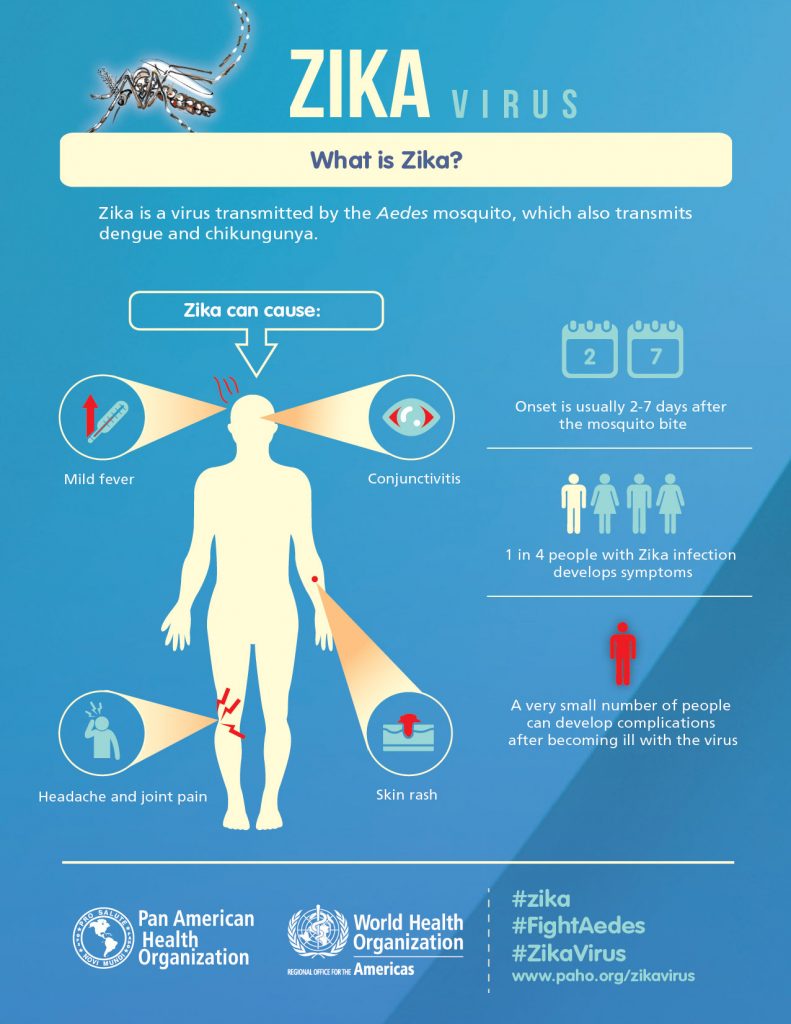The spread of Zika virus in the Western hemisphere and the possible link between the mosquito borne flavivirus and microcephaly has grabbed the attention of the public, the media and the Centers for Disease Control and Prevention (CDC).
CDC interim travel guidance

CDC scientists tested samples provided by Brazilian health authorities from two pregnancies that ended in miscarriage and from two infants with diagnosed microcephaly who died shortly after birth. For the two full-term infants, tests showed that Zika virus was present in the brain. Genetic sequence analysis showed that the virus in the four cases was the same as the Zika virus strain currently circulating in Brazil. All four mothers reported having experienced a fever and rash illness consistent with Zika virus disease (Zika) during their pregnancies.
On Friday, the CDC issued a travel alert (Level 2-Practice Enhanced Precautions) for people traveling to regions and certain countries where Zika virus transmission is ongoing: Brazil, Colombia, El Salvador, French Guiana, Guatemala, Haiti, Honduras, Martinique, Mexico, Panama, Paraguay, Suriname, Venezuela, and the Commonwealth of Puerto Rico.
This alert follows reports in Brazil of microcephaly and other poor pregnancy outcomes in babies of mothers who were infected with Zika virus while pregnant. However, additional studies are needed to further characterize this relationship. More studies are planned to learn more about the risks of Zika virus infection during pregnancy.
Until more is known, and out of an abundance of caution, CDC recommends special precautions for pregnant women and women trying to become pregnant:
- Pregnant women in any trimester should consider postponing travel to the areas where Zika virus transmission is ongoing. Pregnant women who must travel to one of these areas should talk to their doctor or other healthcare provider first and strictly follow steps to avoid mosquito bites during the trip.
- Women trying to become pregnant who are thinking about becoming pregnant should consult with their healthcare provider before traveling to these areas and strictly follow steps to prevent mosquito bites during the trip.
Brazil the source of international spread?
An article published in The Lancet Thursday sought to identify high-risk international pathways for the dispersion of Zika virus and global geographies conducive to autochthonous transmission.
The authors write:
We created a global Zika virus spread model by adapting a seasonal model for dengue that integrates global ecological niche data for Aedes aegypti and albopictus and worldwide temperature profiles.In Brazil, we identified airports within 50 km of areas conducive to year-round Zika virus transmission. We mapped the final destinations of international travellers departing from these airports from September, 2014, to August, 2015, using worldwide flight itinerary data from the International Air Transport Association. We used LandScan, a gridded global population dataset, to estimate numbers of people living in geographies at risk for autochthonous Zika virus transmission.
9·9 million travellers departed from the aforementioned Brazilian airports for international destinations, with 65% to the Americas, 27% to Europe, and 5% to Asia. Traveller volumes were greatest to the USA (2 767 337), Argentina (1 314 694), Chile (614 687), Italy (419 955), Portugal (411 407), and France (404 525). China and Angola received the highest volume of travellers in Asia (84 332) and Africa (82 838), respectively. Argentina, Italy, and the USA have more than 60% of their populations residing in areas conducive to seasonal Zika virus transmission, whereas Mexico, Colombia, and the USA have an estimated 30·5, 23·2, and 22·7 million people, respectively, living in areas conducive to year-round transmission.
2016 Olympics and Zika
The authors in above article end their correspondence writing: The summer Olympic Games in Brazil in August, 2016, heighten the need for awareness of this emerging virus.
“People might go to Brazil, get the infection and bring it home to their home country and if they’re living in an area conducive for seasonal or year-round transmission, the infection will be present in a new area. We don’t even need to wait for the Olympics to happen, it’s happening now,” warned Dr. Isaac Bogoch, a tropical infectious disease specialist at Toronto General Hospital and the University of Toronto.
“[The Olympics] has the potential to amplify spread. It’s something we have to be aware of and certainly have an understanding of,” he told Global News.
Related:


5 thoughts on “Zika update: CDC travel guidance, potential international spread and the Olympics in Brazil”